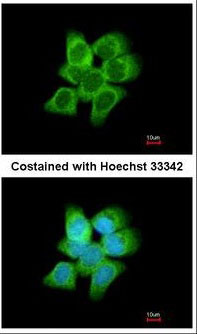DDH / AKR1C1 Antibody (aa22-248)
Rabbit Polyclonal Antibody
- SPECIFICATION
- CITATIONS
- PROTOCOLS
- BACKGROUND

Application
| WB, IHC-P, ICC |
|---|---|
| Primary Accession | Q04828 |
| Reactivity | Human, Mouse |
| Host | Rabbit |
| Clonality | Polyclonal |
| Calculated MW | 37kDa |
| Dilution | ICC (1:100-1:1000), IHC-P (7.5 µg/ml), WB (1:500-1:3000) |
| Gene ID | 1645 |
|---|---|
| Other Names | Aldo-keto reductase family 1 member C1, 1.1.1.-, 20-alpha-hydroxysteroid dehydrogenase, 20-alpha-HSD, 1.1.1.149, Chlordecone reductase homolog HAKRC, Dihydrodiol dehydrogenase 1/2, DD1/DD2, High-affinity hepatic bile acid-binding protein, HBAB, Indanol dehydrogenase, 1.1.1.112, Trans-1, 2-dihydrobenzene-1, 2-diol dehydrogenase, 1.3.1.20, AKR1C1, DDH, DDH1 |
| Target/Specificity | Human DDH / AKR1C1 |
| Reconstitution & Storage | Keep as concentrated solution. Aliquot and store at -20°C or below. Avoid multiple freeze-thaw cycles. |
| Precautions | DDH / AKR1C1 Antibody (aa22-248) is for research use only and not for use in diagnostic or therapeutic procedures. |
| Name | AKR1C1 |
|---|---|
| Synonyms | DDH, DDH1 |
| Function | Cytosolic aldo-keto reductase that catalyzes the NADH and NADPH-dependent reduction of ketosteroids to hydroxysteroids (PubMed:19218247). Most probably acts as a reductase in vivo since the oxidase activity measured in vitro is inhibited by physiological concentrations of NADPH (PubMed:14672942). Displays a broad positional specificity acting on positions 3, 17 and 20 of steroids and regulates the metabolism of hormones like estrogens and androgens (PubMed:10998348). May also reduce conjugated steroids such as 5alpha- dihydrotestosterone sulfate (PubMed:19218247). Displays affinity for bile acids (PubMed:8486699). |
| Cellular Location | Cytoplasm, cytosol. |
| Tissue Location | Expressed in all tissues tested including liver, prostate, testis, adrenal gland, brain, uterus, mammary gland and keratinocytes. Highest levels found in liver, mammary gland and brain |
| Volume | 50 µl |

Thousands of laboratories across the world have published research that depended on the performance of antibodies from Abcepta to advance their research. Check out links to articles that cite our products in major peer-reviewed journals, organized by research category.
info@abcepta.com, and receive a free "I Love Antibodies" mug.
Provided below are standard protocols that you may find useful for product applications.
Background
Converts progesterone to its inactive form, 20-alpha- dihydroxyprogesterone (20-alpha-OHP). In the liver and intestine, may have a role in the transport of bile. May have a role in monitoring the intrahepatic bile acid concentration. Has a low bile-binding ability. May play a role in myelin formation.
References
Stolz A.,et al.J. Biol. Chem. 268:10448-10457(1993).
Lou H.,et al.J. Biol. Chem. 269:8416-8422(1994).
Ciaccio P.J.,et al.J. Biol. Chem. 269:15558-15562(1994).
Khanna M.,et al.J. Steroid Biochem. Mol. Biol. 53:41-46(1995).
Nishizawa M.,et al.Genes Cells 5:111-125(2000).
If you have used an Abcepta product and would like to share how it has performed, please click on the "Submit Review" button and provide the requested information. Our staff will examine and post your review and contact you if needed.
If you have any additional inquiries please email technical services at tech@abcepta.com.













 Foundational characteristics of cancer include proliferation, angiogenesis, migration, evasion of apoptosis, and cellular immortality. Find key markers for these cellular processes and antibodies to detect them.
Foundational characteristics of cancer include proliferation, angiogenesis, migration, evasion of apoptosis, and cellular immortality. Find key markers for these cellular processes and antibodies to detect them. The SUMOplot™ Analysis Program predicts and scores sumoylation sites in your protein. SUMOylation is a post-translational modification involved in various cellular processes, such as nuclear-cytosolic transport, transcriptional regulation, apoptosis, protein stability, response to stress, and progression through the cell cycle.
The SUMOplot™ Analysis Program predicts and scores sumoylation sites in your protein. SUMOylation is a post-translational modification involved in various cellular processes, such as nuclear-cytosolic transport, transcriptional regulation, apoptosis, protein stability, response to stress, and progression through the cell cycle. The Autophagy Receptor Motif Plotter predicts and scores autophagy receptor binding sites in your protein. Identifying proteins connected to this pathway is critical to understanding the role of autophagy in physiological as well as pathological processes such as development, differentiation, neurodegenerative diseases, stress, infection, and cancer.
The Autophagy Receptor Motif Plotter predicts and scores autophagy receptor binding sites in your protein. Identifying proteins connected to this pathway is critical to understanding the role of autophagy in physiological as well as pathological processes such as development, differentiation, neurodegenerative diseases, stress, infection, and cancer.




